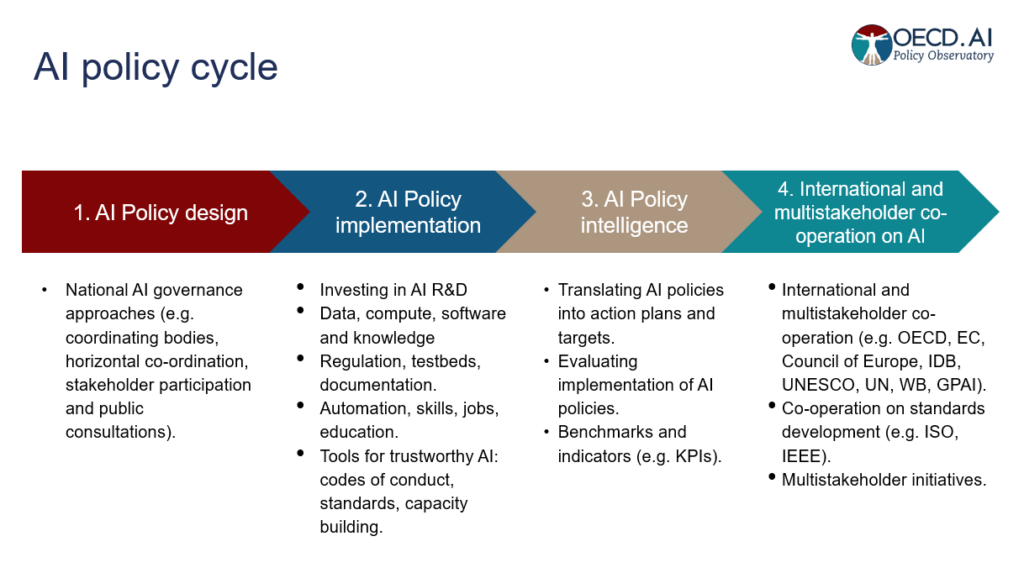Start your day with intelligence. Get The OODA Daily Pulse.
Start your day with intelligence. Get The OODA Daily Pulse.
“Tracking, unpacking and governing the complex field of global AI governance law and policy has quickly become a top tier strategic issue for organizations.” The IAPP and OECD provide tracking resources for your organization to leverage into your AI strategy.
The International Association of Privacy Professionals (IAPP) has released an informative AI tracker that includes “legislative policy and related developments in selected jurisdictions, offering insights into the broader AI landscape in these regions.
According to the IAPP: “Countries worldwide are designing and implementing AI governance legislation commensurate to the velocity and variety of proliferating AI-powered technologies. Legislative efforts include the development of comprehensive legislation, focused legislation for specific use cases, and voluntary guidelines and standards.
This tracker identifies legislative policy and related developments in a subset of jurisdictions. It is not globally comprehensive, nor does it include all AI initiatives within each jurisdiction, given the rapid and widespread policymaking in this space. This tracker offers brief commentary on the wider AI context in specific jurisdictions, and lists index rankings provided by Tortoise Media, the first index to benchmark nations on their levels of investment, innovation and implementation of AI.”
The IAPP Global AI Legislation Tracker can be found at this link.
U.S. (Federal)
The OECD.AI National AI policies & strategies dashboard “provides a live repository of over 800 AI policy initiatives from 69 countries, territories and the EU. Click on a country/territory, a policy instrument or a group targeted by the policy.”
USA-policy-initiatives (in CSV format, downloaded from the OECD dashboard)
The IAPP describes the current AI legistative terrain and provides link to follow-on resources: “As individual jurisdictions press ahead with their own frameworks and approaches, they have also doubled down on multilateral efforts to coordinate and cohere different approaches. The Organisation for Economic Co-operation and Development’s AI principles have been reaffirmed in many different contexts, including by digital and technology ministers of the G7 countries during the 2023 Hiroshima Summit. UNESCO, the International Organization for Standardization, the African Union and the Council of Europe are all working on multilateral AI governance frameworks. The U.K. government is organizing the first AI Safety Summit for government and industry stakeholders to agree upon, evaluate and monitor the most significant risks from AI.
The IAPP AI Governance Center will provide AI governance professionals with the content, resources, networking, training and certification needed to respond to the field’s complex risks.”
The OECD also released the following report:
State of implementation of the OECD AI Principles: Insights from national AI policies: As policy makers and AI actors around the world move from principles to implementation, this report aims to inform the implementation of the OECD AI Principles.
The OECD is positioning the following AI policy cycle as a scalable standardization tool for policymakers:
AI Discipline Interdependence: There are concerns about uncontrolled AI growth, with many experts calling for robust AI governance. Both positive and negative impacts of AI need assessment. See: Using AI for Competitive Advantage in Business.
Emerging NLP Approaches: While Big Data remains vital, there’s a growing need for efficient small data analysis, especially with potential chip shortages. Cost reductions in training AI models offer promising prospects for business disruptions. Breakthroughs in unsupervised learning could be especially transformative. See: What Leaders Should Know About NLP
Technology Convergence and Market Disruption: Rapid advancements in technology are changing market dynamics and user expectations. See: Disruptive and Exponential Technologies.